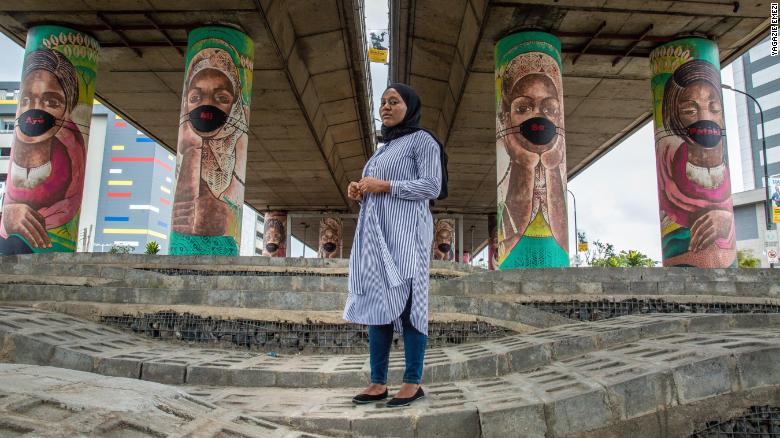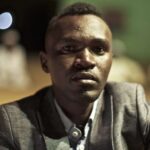In February of 2016, Hauwa Ojeifo considered taking her own life. She had spent a significant part of her teenage and early adult life years battling symptoms such as mood swings, bouts of exhaustion, fainting spells and difficulty recollecting daily events.
She told CNN that growing up, there were days she could not get out of bed to carry out mundane activities like brushing her teeth.
At the time, she did not realize she was experiencing symptoms of bipolar disorder, a mental health condition where a person’s mood swings from high and overactive to low and dull.
“There were a lot of things leading to that moment where I thought about dying. I had an abusive relationship — well, I can’t call it a relationship now because I was like 14 or 15 at the time. But he used to punch me, beat me and gaslight me,” Ojeifo explained.
She added that she was sexually abused in 2014 and did not know how to express being raped by a trusted partner to the people around her. Her experiences, she said, piled up till she eventually snapped and started nursing suicidal notions.
“Trying to explain what was going on in my head was difficult. I looked fine physically, but it started to affect me mentally. I could go a day without being able to construct sentences, and I was a research analyst at the time which meant I had to write daily reports but I couldn’t,” she said.
After expressing her suicidal thoughts to a friend, she was encouraged to see a psychiatrist at a psychiatric hospital in Lagos, one of Nigeria‘s largest cities.
She was diagnosed with Bipolar and post traumatic stress disorder with mild psychosis. “I poured out my heart, got some tests done and eventually got a diagnosis.”
Creating awareness
Two months after Ojeifo’s diagnosis, she said she decided to turn her difficult experiences around. She started to create awareness on the far-reaching impacts of mental health in Nigeria.
In April 2016, she created She Writes Woman, a non-profit organization focused on providing mental health support for those who may need it in the west African nation.
There is minimal mental health awareness and there are not enough mental health professionals in Nigeria.
In a country of more than 200 million people, there are only 250 practicing psychiatrists, according to the Association of Psychiatrists of Nigeria.
Hauwa Ojeifo told CNN that She Writes Woman started as a blog but she realized she could do more with it, “At first, I was just using it as an outlet to share my experiences and that of other women,” she explained.
Eventually, it morphed into a support community for people with mental health conditions.
The 28-year-old got trained as a mental health coach so that she could start a helpline to talk to people experiencing overwhelming mental health symptoms.
“From sharing stories on the blog and social media, She Writes Woman blew up into a helpline which was run by me for a while, and then to a support group for people in vulnerable conditions,” she said.
24-hour mental health helpline
She Writes Woman provides a 24-hour mental health helpline for anyone within Nigeria.
The helpline serves as a first point of contact for people in distress or those who just want to talk about their mental health and symptoms.
“People call the helpline to get what we call a first-aid treatment. On the call you don’t get immediate professional counseling, what happens is you get a first response communication where someone listens to you and what you have to say,” Hauwa Ojeifo explained.
She added that after the first responders, callers can be referred to mental health professionals for therapy or a diagnosis if needed, “depending on what the issue is we que people in to either a therapist or a psychiatrist.”
Data on mental health in Nigeria is hard to find, but according to a 2016 report in the Annals of Nigerian Medicine journal, an estimated 20-30% of the country’s population is suffering from mental disorders.
And in 2017, a World Health Organization report found that Nigerians have the highest incidences of depression in Africa, with more than 7 million people in the country suffering from depression.
Despite the numbers, there is an absence of effective mental health legislation setting standards for psychiatric treatment or encouraging mental health awareness in the country.
In February, following deliberations by legislators to pass a proposed mental health bill, Hauwa Ojeifo became the first person to testify before the Nigerian parliament on the rights of persons with mental health conditions in the country.
The bill has yet to be implemented.To close the mental health gap in Nigeria, Ojeifo’s organization also offers a support group for women and girls called Safe Place in six Nigerian states.
“Safe Space provides a community of shared experiences for women and girls. It provides a space for women to connect and share their experiences on whatever topic, to be there for one another and understand that they are not alone in their journeys,” she explained, estimating that there have been over 50 meetings of the support group since the inception of the organization.
In the beginning, Hauwa Ojeifo, a former investment banker, self-funded the organization.
But now, with donations and grants from organizations such as One Young World, Airtel Nigeria and Disability Rights Advocacy Fund, it is able to expand and carry out more activities in Nigeria’s mental health space.
In 2018, the activist received a Queen’s Young Leaders Award in in recognition of her work with the 24-hour mental health helpline and Safe Space support group.
Changemaker Award Winner
On Tuesday, the Bill & Melinda Gates Foundation named Ojeifo as its Changemaker Award winner for 2020 for her work with She Writes Woman.
The Changemaker Award is one of the Goalkeepers Global Goals Awards pushed yearly by the foundation. It celebrates individuals who have inspired change from a position of leadership or using their personal experience.
In a statement released Tuesday, the Bill & Melinda Gates Foundation said it recognized the activist for her work in promoting Gender Equality, the fifth global goal for sustainable development prescribed by the United Nations.
Ojeifo said that she was in “disbelief” when she first received the email alerting her that she was a recipient of the award.
“It was so unexpected and it came as a surprise because I was not expecting it. It’s like an added validation to the work She Writes Woman does,” she said.”
During one of the meetings with the Bill & Melinda Gates Foundation I asked them how I was selected because I was just so blown away. I was told that it was because I had used my personal experience to build hope for people and to drive change,” she added.
Through the 2020 Changemaker Award, Ojeifo is hoping to gather a network that will help amplify the work She Writes Woman does even more.
“The Changemaker award means I am part of this network that is dedicated to amplifying my cause and giving me visibility,” she said.














